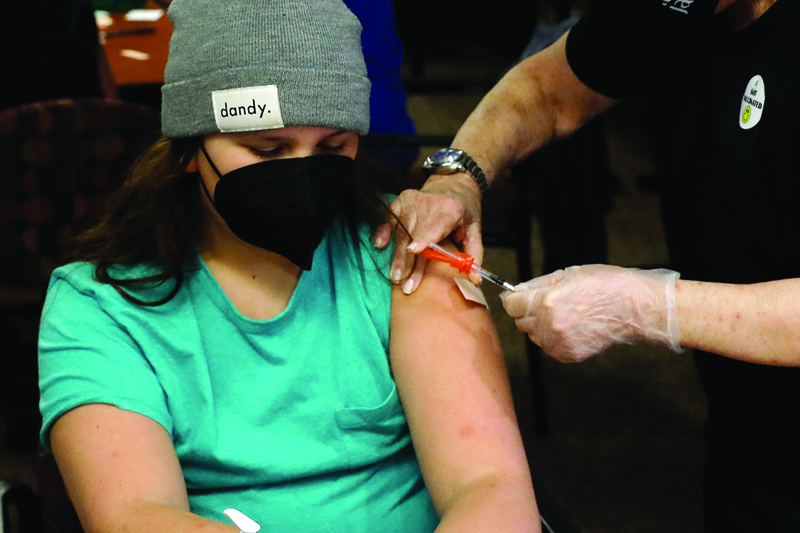 BLOOMFIELD HILLS, Michigan: In this photo taken on May 13, 2021, Dash Hunger, 12, receives the Pfizer-BioNTech COVID-19 vaccine. - AFP
BLOOMFIELD HILLS, Michigan: In this photo taken on May 13, 2021, Dash Hunger, 12, receives the Pfizer-BioNTech COVID-19 vaccine. - AFP
WASHINGTON: A panel of experts convened by the top US health agency was meeting yesterday to review data surrounding more than 300 confirmed cases of heart inflammation among adolescents and young adults after receiving mRNA Covid vaccines. The committee, hosted by the Centers for Disease Control and Prevention (CDC), was to hear a risk-benefit analysis as researchers probe the shots' probable links to myocarditis. The independent experts were to hear from CDC scientists that "the benefits still clearly outweigh the risks for COVID-19 vaccination in adolescents and young adults", according to slides posted on the agency's website.
As of June 11, 323 people under the age of 29 who received mRNA COVID vaccines have had confirmed cases of heart inflammation, myocarditis, or inflammation of the heart lining, pericarditis, the experts were told. Of these cases, 309 were hospitalized, of whom 295 were discharged, nine remain hospitalized with two in intensive care, and there is no outcome data for five cases.
The cases are predominantly among males, most occur after the second dose, and there are no confirmed deaths at this time. More than 50 million doses of both the Pfizer and Moderna mRNA vaccines had been administered to young people aged 12-19 as of June 11. While the case numbers are low, they are still higher than what would be expected in the age groups and the CDC is studying what the biological trigger might be.
"Myocarditis is a rare disease but it's not a new disease, it's been around for a while," said Matthew Oster, a member of the CDC's COVID vaccine task force. "Traditionally there have been thought to have viral triggers, although there can be others. It does appear that mRNA vaccine may be a new trigger for myocarditis," he added.
But according to CDC modeling based on data from late May, the risk-benefit profile still favors the use of COVID vaccines, even though young people are at lower risk of severe COVID compared to older people. For every million second doses given to 12-to-17-year-old boys, 5,700 COVID cases, 215 hospitalizations, 71 ICU admissions and two deaths would be prevented across 120 days, according to the analysis. Between 56 to 69 cases of myocarditis would be expected.
Lorry Rubin, director of pediatric infectious diseases at Cohen Children's Medical Center told AFP that his own hospital had seen a few cases of adolescent males developing chest pain a day or two after the second dose of an mRNA vaccine. The Pfizer vaccine is currently the only shot authorized in adolescents aged 12 and up. Moderna is authorized from age 18 upwards.
"The cases have been relatively mild," added Rubin, with the patients returning to normal within a few days after treatment with medicine like ibuprofen. Myocarditis is estimated to affect about 0.8 per 100,000 children per year and is more common among infants and teens. Even if a causal link to the vaccines is established, Rubin said it should be weighed against the risks to children from COVID.
While children are less affected than adults, the virus has still hospitalized more than 3,000 children in the United States over the course of the pandemic, and led to more than 300 deaths, according to official data. Some 2,700 people under 30 have died from COVID.
"We've actually had more kids infected with COVID that we know who have had long term impacts, some of whom have been quite ill with cardiac symptoms in the hospital," stressed Lee Savio Beers, president of the American Academy of Pediatrics.
Other experts have adopted a more cautious line. Monica Gandhi, an infectious diseases and public health expert at the University of California San Francisco, said that the United States had gone beyond some other countries' recommendations on vaccinating teens. These include Germany and the Zionist entity, which only recommend vaccinating adolescents who are at high risk, while Britain is still examining the data and hasn't yet reached a decision. - AFP




